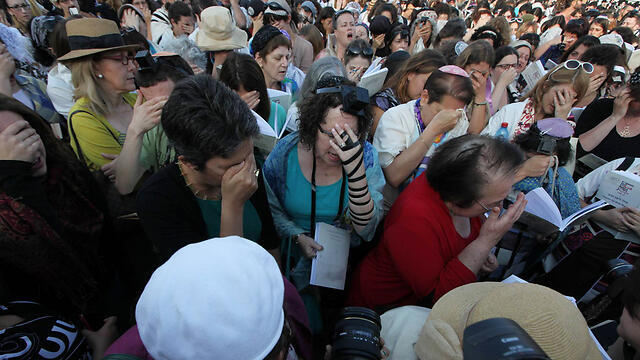The government approved on Sunday the creation of a mixed prayer area at the Western Wall in which both men and women can pray together.
According to the proposed arrangement, a new prayer area will be set up south of the existing separate prayer areas. The new prayer area will be modeled on the one set up at Robinson's Arch two years ago where Women of the Wall could worship, and will allow Reform and Conservative Jews to pray according to their custom.
- This is an achievement for the Women of the Wall group, which has been fighting for women's prayer rights at the Kotel, aided by both female and male MKs. The Women of the Wall group wishes to pray and read from the Torah collectively and out loud at the Western Wall, while also wearing prayer shawls.
The compromise agreement, which was formulated by a team headed by Cabinet Secretary Avichai Mandelblit and signed by Women of the Wall and the Western Wall Heritage Foundation, ensures that "the Western Wall will be open and accessible to any Jew seeking to pray in a manner that befits his identify and beliefs."
The new prayer area will be made "respectable, accessible and visible, and serve as an integral part of the Western Wall site."
However, the new area will not be connected to the existing separate men and women sections, as it is on a lower level, and located on the other side of the Mughrabi Bridge leading to the Temple Mount. In addition, because of the political sensitivity over construction at the site, it is not possible to create contiguity between the different prayer areas, but the three areas will share an entrance.
The Western Wall Heritage Foundation will not be responsible over the new area, as it is on the existing one - it will instead be managed by a public council formed at the Prime Minister's Office. Among the council's members will be representatives of the non-Orthodox sectors and Women of the Wall. In return, the Chief Rabbinate will have full authority over the prayer customs at the existing separate men and women prayer sections.
Prime Minister Benjamin Netanyahu called the proposal "a compromise on this delicate issue in a place that is supposed to unite the Jewish People. While I know that this is a delicate issue, I think that this is a fair and creative solution."
While voting against the plan, ministers from the ultra-Orthodox parties Shas and United Torah Judaism decided not to use their right of veto to thwart the plan, which would have led to a crisis in the coalition because they view it as "the lesser of evils" compared to previous proposals that allocated larger areas of prayer for the mixed section.
The haredim are worried of the precedent set by the plan, which will in effect serve as state recognition of Reforms and Conservatives as legitimate Jewish movements. On the other hand, the agreement does enshrine in law the ultra-Orthodox control over the existing prayer area, keeping liberal entities away from it.
Agriculture Minister Uri Ariel (Bayit Yehudi) said ahead of the vote that he intends to oppose the plan, saying it is "unnecessary and hurts the Jewish tradition, which is important to all of us. The reform Jews from Israel, and mostly from abroad, are intentionally harming the values we hold dear, and allowing them into the Western Wall (on its southern side) will offend traditional Israeli citizens."
But it's not just members of the religious factions that opposed the proposal. The project is estimated to cost over NIS 30 million and according to government officials, three Likud ministers - Ze'ev Elkin, Yariv Levin and Miri Regev - all refused to allocate funds for the prayer area from their ministries.
Because of that, the Prime Minister's Office, the Finance Ministry and the Diaspora Affairs Ministry allocated a total of NIS 25 million from their respective budgets to set up the prayer area and its access paths to the Western Wall, while the Jewish Agency will add NIS 10 million for the project. An additional NIS 10 million are still needed and a solution for that will be found in the coming month.
Moran Azulay, Roi Yanovsky, Kobi Nachshoni and Itamar Eichner contributed to this story.


